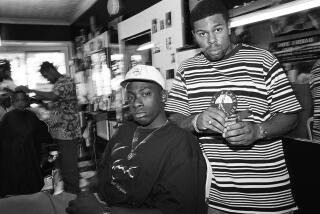His own wavelength
- Share via
Some say Joe Pernice is just another guy who can’t commit. In the early ‘90s, nights spent playing mournful Appalachian ballads in a friend’s kitchen after punk-rock shows converted him from punk to dour alt-country troubadour. A few years later, he lost interest in country, giving up its plain-spoken rawness for the lush, sometimes orchestrated chamber pop of a new band called the Pernice Brothers. The aching sorrow of “Massachusetts” -- 1996’s sadly luminous final record by his country band the Scud Mountain Boys -- seems to have little in common with the burnished pop gems of “Yours, Mine & Ours,” the album he released recently with the Pernice Brothers.
To the New England-bred, Brooklyn-based musician, though, it makes an odd sort of sense. Both country and chamber pop -- a tradition that runs from Brian Wilson and Burt Bacharach through the Scottish band Belle & Sebastian -- drew him with their emotional directness, a quality hard to find in the ‘90s alternative scene.
“They’re popular forms of music that you can be honest in,” says Pernice, 35, who looks and speaks more like a brainy Boston cop than a published poet, die-hard Smiths fan, and master of regret and longing. “I’ve always tried to do that with all my music. I don’t like a lot of irony or pulling the wool over your eyes.”
There’s little wool in “Yours, Mine & Ours” (on the Ashmont label), although there’s much reflecting Pernice’s trademark virtues: sweeping pop hooks, polished arrangements and sharp, often bittersweet lyrics. “The love I have for you,” he swoons on the opening song, “is ruinous and true.”
By the last song, a poison-pen note to an ex, the ruination has won out: “I hope this letter finds you crying,” he sings. “I hope that someday we meet both broken.” It’s the kind of record that gives the lie to the sentiment that indie rock somehow died when Pavement broke up in 1999.
Although the band’s following will likely remain a dedicated cult, the album is strong enough to justify the praise of “High Fidelity” author Nick Hornby, who wrote in the New Yorker last year that the group belonged in “my little private Top Ten.” (The group, which plays July 4 at Spaceland, includes his sibling Bob and members of the sometimes Kinks-y, sometimes trippy, chameleon-like Lilys.)
The Pernice Brothers aren’t the only tuneful, inventive rock band toiling in obscurity. Ted Leo & the Pharmacists, the Go-Betweens and the New Pornographers, for instance, are all seeking immortality with the vaguely Beatles-esque three-minute pop song, but are unlikely to dent the Billboard charts.
More than the previous two Pernice Brothers albums -- “Overcome by Happiness” and “The World Won’t End” -- this is a guitar record, full of great, ascending lines that both punctuate and challenge the sorrow of the lyrics. But Pernice’s greatest gift is his knack for easy, natural melody, which he picked up from listening to everything from the Beatles to the forgotten one-hit wonders he heard as a kid.
“I listened to AM radio either on clock radios, on transistor radios with those little earplugs, or in cars,” says Pernice, who grew up on Boston’s middle-class South Shore and spent the ‘90s as part of Northampton’s indie scene. “It wasn’t just the songs, it was the sound of it coming through those little speakers.”
Scandinavian inspiration
These days, Pernice doesn’t fuzz up the songs the way a lo-fi musician might. Instead, he compresses the sound -- shortening the dynamic range -- in the style of old AM signals. As a result, the songs have an old-school sheen and musical density that makes them sound simultaneously nostalgic and fresh.
“Those were the earliest influences, the earliest exciting music I ever heard,” he says. “Who knows, if it’d been klezmer music, maybe I’d be a clarinet player.”
Although AM radio, songwriter Jimmy Webb and British punk shaped Pernice’s music, his lyrics came from a different source: contemporary poetry. But Pernice despised verse until the tail end of college.
“I hadn’t really read any poetry since high school,” he recalls. “You know, you read these poems about the flag and about liberty, all that. No wonder no one wants to read poetry as a kid: It’s a snoozefest.”
But when he picked up a book by the Serbian surrealist Charles Simic, acclaimed for his terse, cryptic poems, Pernice was hooked. Later, as a graduate student at the University of Massachusetts at Amherst, he studied with poet James Tate, and fell for the understated stories of Raymond Carver and Anton Chekhov and the dark, deceptively simple Swedish poet Tomas Transtromer.
“He tends to have very vivid images -- they’re blazing,” Pernice says, describing a Transtromer poem about a train stopped on a field at 2 a.m. Change the Scandinavian setting and it could be a Pernice Brothers song.
“I try to go for compression, for economy of language,” the songwriter says. “I still have a habit I’ve held over from writing poetry, where I’m a fierce editor.”
Pernice’s next project brings together his interest in words and music. He’s completing a book about the Smiths’ “Meat Is Murder” album -- part of a new Continuum Books series that pairs writers with records that move them. His book, due this fall, is the fictitious memoir of a young fan whose inner life is rearranged by the album.
The musician in Pernice loves the hooks, the playing of Smiths guitarist Johnny Marr (“king of the minor seventh,” he calls him) and the shimmery production. But it’s pretty clear the band’s meaning was personal more than anything.
“I was a freak for the Smiths,” Pernice says of his days in a Catholic high school ruled by classic rock and a less ambiguous masculinity. “You were looking for trouble if you were into them. Morrissey was honest and emotional at a time when that meant putting your neck on the line. It was the perfect record to be a miserable kid to.”
More to Read
The biggest entertainment stories
Get our big stories about Hollywood, film, television, music, arts, culture and more right in your inbox as soon as they publish.
You may occasionally receive promotional content from the Los Angeles Times.










